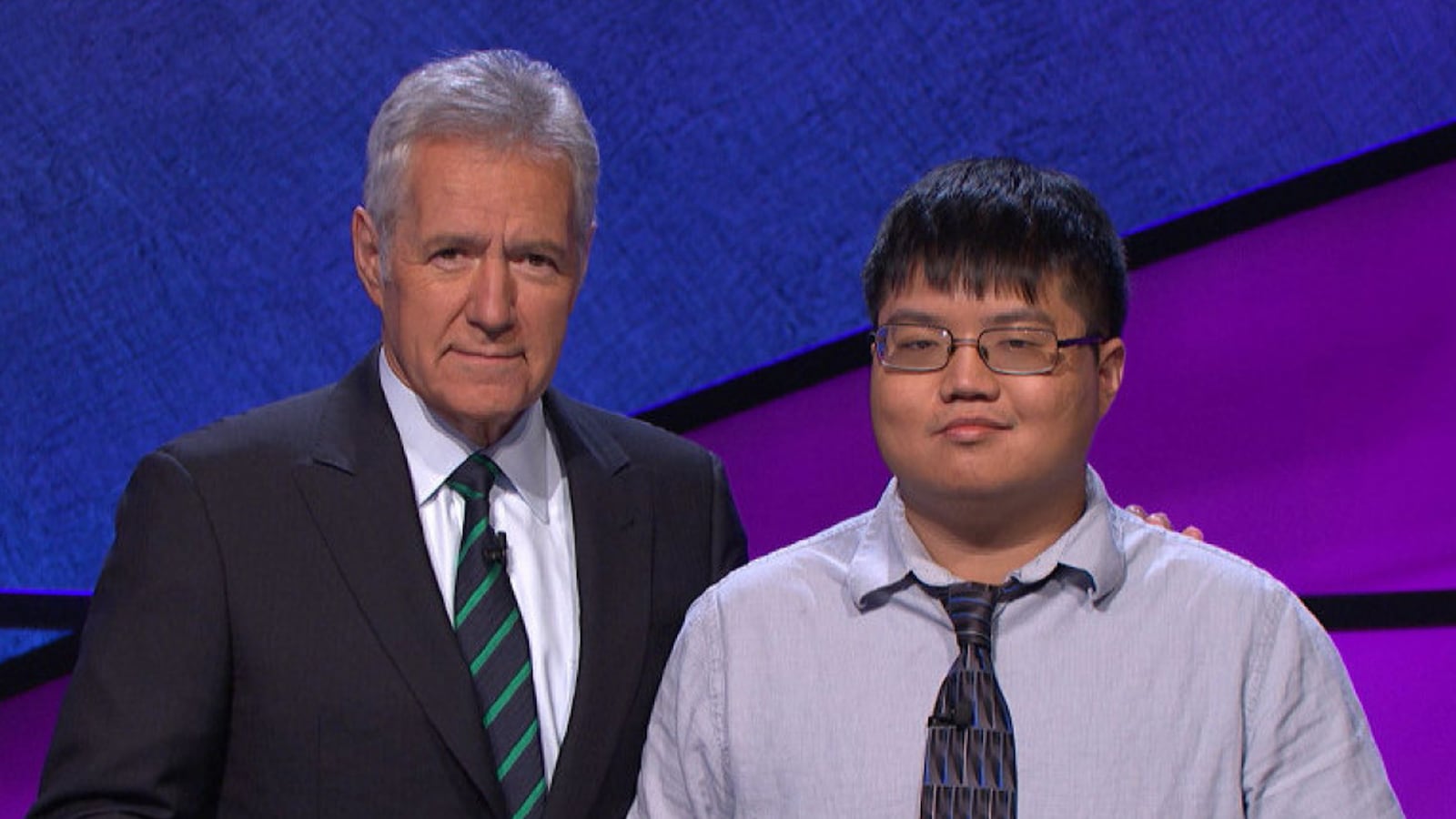It's been the best of times for Arthur Chu: four victories and a six-figure paycheck on Jeopardy!, a streak he'll attempt to continue on Monday.

For many fans, however, it's been the opposite. Chu's unusual style of play has angered a large contingent of his audience, earning him the title of "Jeopardy! Villain" and comparisons with Richard Hatch, the conniving champion of the original Survivor. (Unlike Hatch, Chu has managed to keep his clothes on. At least for now.)
Criticizing contestants is one of the great joys of watching game shows, of course; let he who hasn't shouted at the "idiots" messing up on national TV cast the first stone. Wardrobe, mannerisms, and intonation are fair game, and Chu certainly has his detractors there.
In this case, though, viewers have claimed Chu is ruining the game. It's a bold assertion, but not one without merit. That's because Jeopardy!, 30 years strong under host Alex Trebek, has a unique quirk: a fundamental disconnect between the way it's played and how it's watched.
Most programs use a linear format. On Wheel of Fortune, everyone's stuck with the same puzzle until someone solves it. On Who Wants to Be a Millionaire?, the next question is pre-ordained. You, playing along at home, might say C when the contestant says D, but the subsequent step is straightforward.
The Jeopardy! board, on the other hand, is a nerdier version of a choose-your-own-adventure book. Each round starts with 30 clues varying in topic, value, and difficulty; after responding correctly, a contestant may select any of those remaining.
Most players tend to work each of the categories from top to bottom. Tackling the lower-value clues helps the contestants—both on screen and on couch—establish a rhythm before hitting the tougher, big-money answers. You can fixate your brain on "Potent Potables" for five progressively harder questions, then on "Kings of England" for five more.
Chu, to the chagrin of many, employs a strategy called "The Forrest Bounce.” Pioneered by Chuck Forrest, who won the show’s second Tournament of Champions in 1986, the idea is to start toward the bottom of the board, and to switch categories after each clue. Not only does this often bewilder your opposition, it gives you better odds of uncovering the Daily Doubles, which allow the finder the opportunity to risk up to his entire total.
It's an unusual approach, yes—but as mega-champion Ken Jennings points out, it's what IBM computer Watson did en route to crushing all of humanity. If a computer can do it, why can't Arthur Chu?
Unsurprisingly, this also confuses the audience, and they've taken to social media to complain about how this tweak has spoiled their daily mental constitutionals. But Chu doesn't care if he's "unwatchable" or "boring"—he cares about winning the game, and the life-changing amounts of money that come with it. He's doing what his research suggests is the best way to go, and so far, he's been right.
And that might be the most shocking aspect of the backlash: that people are pissed that someone would prepare for a game show, studying strategy to maximize his chances of winning. That'd be like Seahawks fans calling Pete Carroll annoying for watching tape of the Broncos before the Super Bowl.
Here's the thing: many players treat Jeopardy! like they might a Mean Girls-themed trivia night: bone up on the topics you're pretty sure you'll see, then hope you answer more than the other people. But esoteric knowledge is a small part of the game; mastering the timing to ring in, finding the Daily Doubles, and wagering have outsized importance. Plus, very few people have time to cram for Jeopardy!. (As all-time great Bob Harris, unemployed at the time of his initial appearance, wrote of his first victory: "The other players had jobs. I kicked ass.")
With only a month to prep, Chu went for the jugular. He figured out which buzzing method worked best for him. He read up on the Forrest Bounce. He developed a heuristic for betting on Daily Doubles (which resulted in a wager of $5, the minimum allowed). And he found my blog, The Final Wager, in which I analyze Final Jeopardy! strategy in simple terms.
Using my tutorial as a script, he's eschewed the typical "wager to win by a dollar" approach in favor of one that allows the second-place player to tie if she goes all-in. One of his opponents recognized this peculiarity and earned a $26,800 payday and a second appearance, at no cost to Chu (he won the rematch by a wide margin). Kibitzers thought he was being generous, or that he sought sexual favors in return.
Neither. He was giving himself what his research—game theory, in this case—taught him was the best chance to win. Goading the second-place player into wagering everything when she doesn't have to increases your odds of returning the next day by 20%-25%, in my reckoning.
Some writers have wondered if the producers might change the rules to prohibit this type of play. No way. If anything, this media attention will boost their ratings. Plus—and I can tell you this from personal experience, as the 2003 College Champion—the Forrest Bounce requires far too much focus for mere mortals. Chu is a machine.
He's also not a villain; he just did his homework. He's that guy who actually reads the PowerPoint slides before the meeting. You might think he's a brownnoser, but when the axe comes down, as it does at the end of each Jeopardy! episode, he'll stand the best chance of keeping his job—and of taking home a bigger paycheck.






